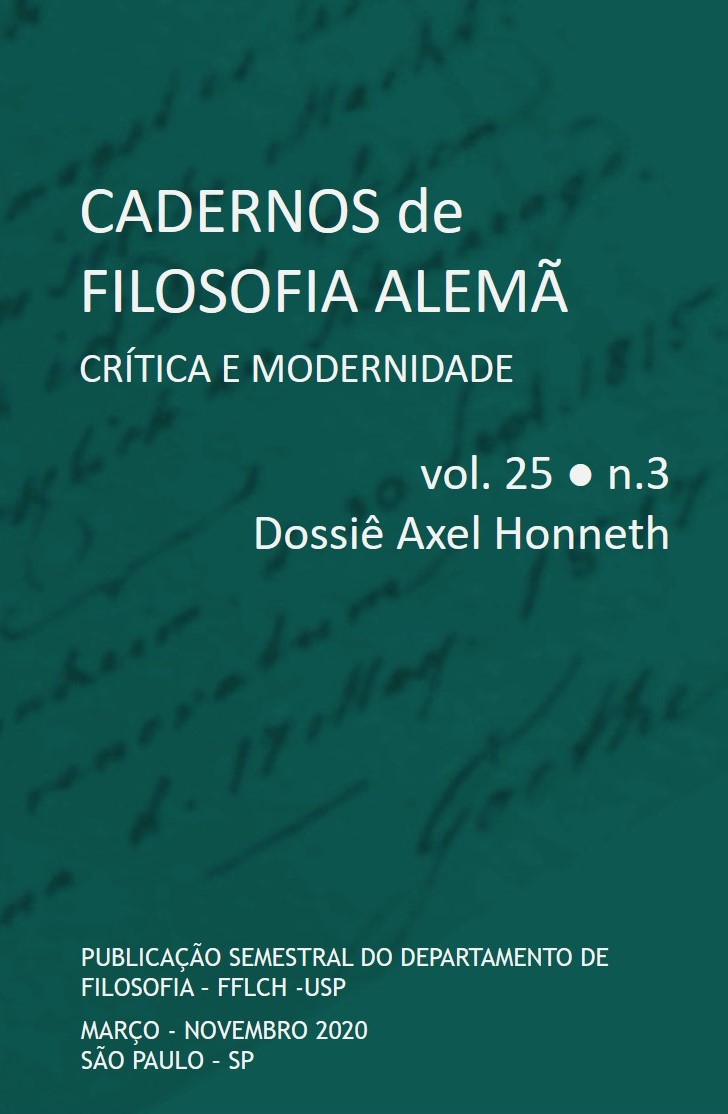Democracy as Form of Life: Political Culture and Democratic Ethicity in Axel Honneth
DOI:
https://doi.org/10.11606/issn.2318-9800.v25i3p75-94Keywords:
Democratic Ethicity, Form Of Life, Political Culture, Critical Theory Of DemocracyAbstract
The article intends to analyze the idea of democracy as a form of life based on Axel Honneth’s most recent works. In the first section, I differentiate the normative conception of social democracy developed by Honneth, comparing it to the republican and procedural versions. Then, I analyze how democratic ethicity could be presented in a greater degree of complexity, paying attention to the effectiveness of freedom in three central social spheres: personal relationships, economic interactions and political will formation. It is a matter of paying attention, above all, to the way in which democratic political culture condenses the correlation between different social spheres. I close the article by emphasizing some limits of the reflection provided by the author. On the one hand, systematic phenomena of violence and domination, which in fact endanger a socially effective democracy, are absent from its formulation; on the other hand, the role of social struggles for the differentiated realization of freedom in our political culture is not clear.
Downloads
References
Brittain, A. e Maynard, M. (1984). Sexism, Racism, and Oppression. New York: Blackwell.
Collins, P. H. (2016). Aprendendo com a outsider within: A significação sociológica do pensamento feminista negro. Revista Sociedade e Estado, 31(1), 99-127. DOI: https://doi.org/10.1590/S0102-69922016000100006
Collins, P. H. (2019). Pensamento feminista negro. São Paulo: Boitempo.
Davis, A. (2016). Mulheres, raça e classe. São Paulo: Boitempo.
Deranty, J- P. (2018). A teoria crítica entre Marx e Honneth. Civitas, 18(3), 630-653. DOI: https://doi.org/10.15448/1984-7289.2018.3.32249
Dewey, J. (1954). The Public and its Problems. Chicago: The University of Chicago Press.
Forst, R. (2010). Contextos da justiça. São Paulo: Boitempo.
Habermas, J. (2018). “Três modelos normativos de democracia”. In: Habermas, J. A inclusão do outro. São Paulo: UNESP.
Habermas, J. (2020). Facticidade e validade. São Paulo: UNESP.
Honneth, A. (1986). Kritik der Macht. Frankfurt am Main: Suhrkamp.
Honneth, A. (2000a). “Pathologien des Sozialen: Tradition und Aktualität der Sozialphilosophie”. In: Honneth, A. Das Andere der Gerechtigkeit. Frankfurt am Main: Suhrkamp.
Honneth, A. (2000b). “Demokratie als reflexive Kooperation: John Dewey und die Demokratietheorie der Gegenwart”. In: Honneth, A. Das Andere der Gerechtigkeit. Frankfurt am Main: Suhrkamp.
Honneth, A. (2003). Luta por reconhecimento: A gramática modal dos conflitos sociais. São Paulo: Ed. 34.
Honneth, A. (2007). Sofrimento de indeterminação: Uma reatualização da filosofia do direito de Hegel. São Paulo: Esfera Pública.
Honneth, A. (2011). Das Recht der Freiheit. Berlim: Suhrkamp.
Honneth, A. (2014). Barbarizações do conflito social. Civitas, 14(1), 154-176. DOI: https://doi.org/10.15448/1984-7289.2014.1.16941
Honneth, A. (2015). Die Idee des Sozialismus. Berlim: Suhrkamp.
Honneth, A. (2018). Reificação: Um estudo de teoria do reconhecimento. São Paulo: UNESP.
Honneth, A. (2020). Die Armut unserer Freiheit. Frankfurt am Main: Suhrkamp.
Jaeggi, R. (2014). Kritik von Lebensformen. Berlin: Suhrkamp.
Kilomba, G. (2019). Memórias da plantação: Episódios de racismo cotidiano. Rio de Janeiro: Cobogó.
Melo, R. (2014). Da teoria à práxis? Axel Honneth e as lutas por reconhecimento na teoria política contemporânea. Revista brasileira de ciência política, 15, 17-36. DOI: https://doi.org/10.1590/0103-335220141502
Melo, R. (2017a). A soberania popular revisitada: Autogoverno como modo de vida. Cadernos de Filosofia Alemã: Crítica e Modernidade. 22(3), 57-68. DOI: https://doi.org/10.11606/issn.2318-9800.v22i3p57-68
Melo, R. (2017b). “Esfera pública e cultura política: Hipóteses de investigação sobre as novas mobilizações sociais no Brasil”. In: Werle, D. L. et. al. (orgs.). Justiça, teoria crítica e democracia. Florianópolis: Nefipo Online.
Melo, R. (2018). Dimensões políticas do reconhecimento e seus limites. Dissonância, 2, 112-148.
Nobre, M. (2013). “Reconstrução em dois níveis: Um aspecto do modelo crítico de Axel Honneth”. In: Melo, R. (org.). A teoria crítica de Axel Honneth: Reconhecimento, liberdade e justiça.
Pinsdorf, C. (2016). Lebensformen und Anerkennungsverhältnisse. Berlin: Walter de Gruyter.
Silva, F. G. (2013). “Um ponto cego no pensamento político? Teoria crítica e a democratização da intimidade”. In: Melo, R. (org.). A teoria crítica de Axel Honneth: Reconhecimento, liberdade e justiça.
Teixeira, M. O. N. (2016). Patologias sociais, sofrimento e resistência: Reconstrução da negatividade latente na teoria crítica de Axel Honneth. Tese de doutorado. Unicamp.
Wellmer, A. (1993). “Bedingungen einer demokratischer Kultur. Zur Debatte zwischen ‘Liberalen’ und ‘Kommunitaristen’”. In: Wellmer, A. Endspiele: Die unversöhnliche Moderne. Frankfurt am Main: Suhrkamp.
Downloads
Published
Issue
Section
License
Copyright (c) 2020 Rúrion Melo

This work is licensed under a Creative Commons Attribution-NonCommercial-ShareAlike 4.0 International License.
Information and conceptions on the texts are complete responsibility of the authors.
All the articles submitted before July 5th 2018 and those published after July 2021 are licensed under a CC BY-NC-ND license – except those published between the aforementioned dates, which are under the CC BY-NC-SA license. The permission for the translation of the material published under the license CC BY-NC-ND by third parts can be obtained with the consent of the author.
Open access policies - Diadorim
Rules applied before July 5th 2018:
Presenting a submission to our Editorial Board implies granting priority of publication for “Cadernos de filosofia alemã”, as well as transferring the copyright of texts (once published), which will be reproduced only with the manifest authorization of the editors. Authors keep the right to reuse the texts published in future editions of their work, without paying any fees to "Cadernos”. We will not grant the permission to re-edit or translate the texts for third parts without agreement of the author.


